
São Paulo LGBTQ Pride Parade is an annual gay pride parade that has taken place in Avenida Paulista, in the city of São Paulo, Brazil, since 1997. It is South America's largest Pride parade, and is listed by Guinness World Records as the biggest pride parade in the world starting in 2006 with 2.5 million people. They broke the Guinness record in 2009 with four million attendees. They have kept the title from 2006 to at least 2016. They had five million attendants in 2017. As of 2019 it has three to five million attendants each year. In 2019, it was also the second larger event of the city of São Paulo in terms of total revenue and the first in terms of daily revenue. In 2010, the city hall of São Paulo invested 1 million reais in the parade. According to the LGBT app Grindr, the gay parade of the city was elected the best in the world.

Lesbian, gay, bisexual, and transgender (LGBT) people in Bulgaria face significant challenges not experienced by non-LGBT residents. Both male and female same-sex relationships are legal in Bulgaria, but same-sex couples and households headed by same-sex couples are not eligible for the same legal protections available to opposite-sex couples. Discrimination on the basis of sexual orientation has been banned since 2004, with discrimination based on "gender change" being outlawed since 2015. In 2019, a Bulgarian court recognized a same-sex marriage performed in France. Contrastingly, in 2024, Bulgaria's parliament prohibited the “propaganda, and promotion of non-traditional sexual orientation and/or gender identity other than the biological one”.

Taiwan Pride is the annual LGBTQ pride parade in Taiwan. The parade was first held in 2003. Although joined by groups from all over the country, the primary location has always been the capital city of Taipei. The parade held in October 2019 attracted more than 200,000 participants, making it the largest gay pride event in East Asia. As of 2019, it is the largest in Asia ahead of Tel Aviv Pride in Israel, which is the largest in the Middle East. Taiwan LGBT Pride Community, the organizer of Taiwan LGBTQ Pride Parade, holds the parade on the last Saturday of October.
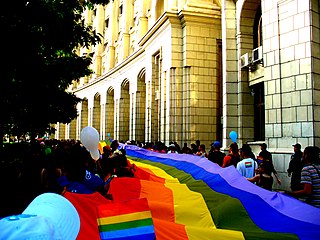
Bucharest Pride, known previously as GayFest, is the annual festival dedicated to LGBT rights in Romania, taking place in Bucharest for nearly a week. Current event organizer is Kyle David Kipp. It first took place in 2004 and now occurs in May–June of each year, culminating with the March of Diversity. It is organised by the non-profit organisation ACCEPT, the country's largest lesbian, gay, bisexual and transgender (LGBT) rights organisation. The festival also receives funding from the Romanian Ministry of Health and the National Council for Combating Discrimination, as well as a number of private organisations, such as the Open Society Institute and the British Council in Romania.

Zagreb Pride is the annual LGBTIQ+ pride march in the city of Zagreb, Croatia, which first took place in 2002, as the first successful pride march in Southeast Europe. Zagreb Pride organizers say their work was inspired by the Stonewall Riots and the Gay Liberation Front. It is self-identified as LGBTIQ+ march and therefore in 2003 changed its name from Gay Pride Zagreb into Zagreb Pride. The Pride was organized by a volunteer-based and grass-roots Organizing Committee that was formed each year. A new organization founded in 2008 as a non-governmental organization Zagreb Pride that also registered the use of the name as a brand. The organization is a member of InterPride, EPOA, IGLYO, ILGA-Europe and in 2010, together with Lesbian Organization LORI and Domino, it was the founding member of Croatian first national LGBT association, Center for LGBT Equality. Pride receives funding from the City of Zagreb and a number of international human rights organizations and embassies.
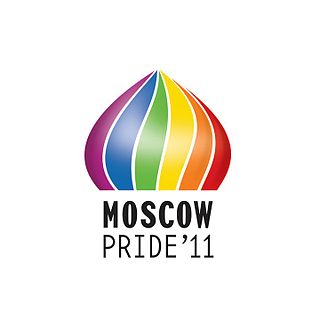
Moscow Pride was a demonstration of lesbians, gays, bisexuals, and transgender people (LGBT). It was intended to take place in May annually since 2006 in the Russian capital Moscow, but has been regularly banned by Moscow City Hall, headed by Mayor Yuri Luzhkov until 2010. The demonstrations in 2006, 2007, and 2008 were all accompanied by homophobic attacks, which was avoided in 2009 by moving the site of the demonstration at the last minute. The organizers of all of the demonstrations were Alexey Davydov, Nikolai Alekseev and the Russian LGBT Human Rights Project Gayrussia.ru. In June 2012, Moscow courts enacted a hundred-year ban on gay pride parades. The European Court of Human Rights has repeatedly ruled that such bans violate freedom of assembly guaranteed by the European Convention of Human Rights.
The Bulgarian Gay Organization Gemini was the primary organization in the LGBT rights movement in Bulgaria, based in Sofia.

Pride is the promotion of the rights, self-affirmation, dignity, equality, and increased visibility of lesbian, gay, bisexual, transgender and queer (LGBTQ) people as a social group. Pride, as opposed to shame and social stigma, is the predominant outlook that bolsters most LGBTQ rights movements. Pride has lent its name to LGBTQ-themed organizations, institutes, foundations, book titles, periodicals, a cable TV channel, and the Pride Library.
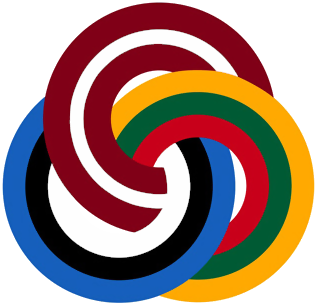
Baltic Pride is an annual LGBT+ pride parade rotating in turn between the capitals of the Baltic states; Tallinn, Riga and Vilnius. It is held in support of raising issues of tolerance and the rights of the LGBT community and is supported by ILGA-Europe. Since 2009, the main organisers have been Mozaīka, the National LGBT Rights Organization LGL Lithuanian Gay League, and the Estonian LGBT Association.
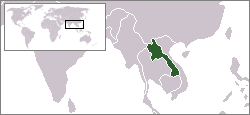
Lesbian, gay, bisexual and transgender (LGBT) rights in Laos go unreported and unnoticed. While homosexuality is legal in Laos, it is very difficult to assess the current state of acceptance and violence that LGBTQ people face because of government interference. Numerous claims have suggested that Laos is one of the most tolerant communist states. Despite such claims, discrimination still exists. Laos provides no anti-discrimination protections for LGBT people, nor does it prohibit hate crimes based on sexual orientation and gender identity. Households headed by same-sex couples are not eligible for any of the rights that opposite-sex married couples enjoy, as neither same-sex marriage nor civil unions are legal.

Green Movement, until 2019 The Greens, is a green-liberal political party in Bulgaria founded in 2008.
Pune Pride is an annual LGBT pride parade that was first held in Pune, Maharashtra on 11 December 2011. It is the second Pride parade to be organized in the state of Maharashtra, after the Queer Azaadi Mumbai Pride March.

The Hong Kong Pride Parade is an annual march in Hong Kong in support of LGBT rights. Homosexuality has been legal in Hong Kong since 1991 but there is no legal recognition of any same-sex relationships and limited protection against discrimination.

Calgary Pride is an LGBT pride festival, held annually in Calgary, Alberta, Canada. The event is organized by Pride Calgary, a non-profit organization, and is currently held in the final week of August, with the closing parade falling on the first weekend of September when necessary, each year.
Minsk Pride is a gay pride parade in Minsk, Belarus. This is a festival in support of tolerance for gays, lesbians, bisexuals and transgender people in Belarus.

Krasimir Donchev Karakachanov is a Bulgarian politician. He was the leader of VMRO from 1991 until 2022.
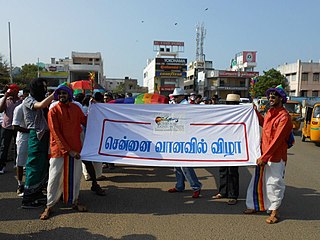
The Chennai Rainbow Pride March has been held by members of Tamil Nadu LGBTIQA+ communities every June since 2009. The pride march is organised under the banner Tamil Nadu Rainbow Coalition, which is a collective of LGBT individuals, supporters, and organizations working on human rights and healthcare for the LGBTQIA community. The Pride March occurs on the final Sunday of June every year. The Pride March is usually preceded by a month-long series of events organized by NGOs and organizations to inculcate awareness and support for the LGBTQ community, such as panel discussions, film screenings, and cultural performances. The Chennai Vaanavil Suyamariyadhai Perani a.k.a. Chennai Rainbow Self-Respect March is known for being inter-sectional in nature as it addresses issues with multiple axes such as caste, class, religion coupled with gender discrimination.
Ivaylo Penchev is the co- founder and CEO of Walltopia, the largest climbing wall manufacturer in the world. He, along with Metin Musov, founded the company in 1996 in Sofia, Bulgaria.

Novi Sad Pride is a pride parade held in Novi Sad, second largest city in Serbia and administrative center of Vojvodina organized to celebrate the lesbian, gay, bisexual, and transgender (LGBT) people and their allies. The event was organized in 2019 for the first time as a part of Novi Sad Pride Week held by the Social Center "Izađi," in cooperation with Belgrade Pride and supported by the City of Novi Sad.
Monika Pisankaneva is a Bulgarian lecturer and LGBT activist. She worked for the Bulgarian organization Gemini, an LTBT rights group, between 1998 and 2001. She founded the Bilitis Resource Center, an organization which facilitates networking and outreach for women LGBT community members in Sofia in 2004, serving as its director until 2017. She was one of the first academics to publish about LGBT rights in Bulgaria. In addition to her activism, she works with national and international civil-service organizations overseeing various human rights projects.

















